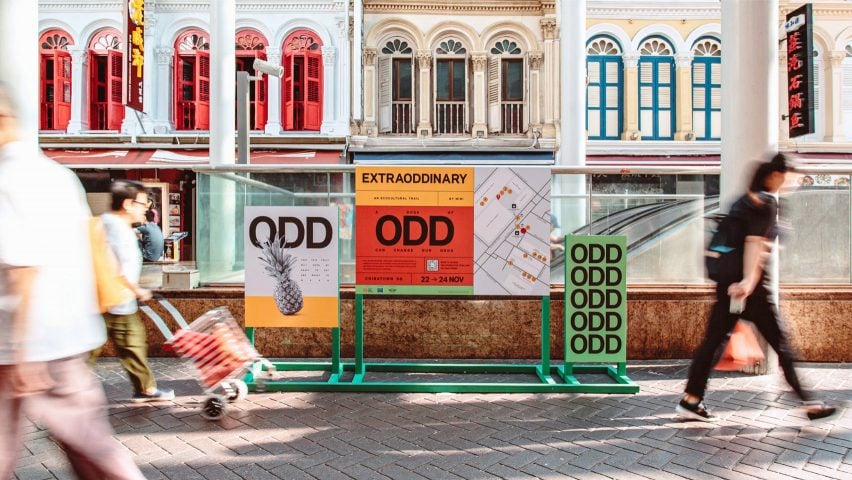Dezeen Promotion: Extraoddinary is a treasure trail of sustainable solutions for urban living put together in Singapore by MINI and creative agency Kinetic.
Featuring packaging made from algae, shoes fashioned from pineapple and souvenirs formed from discarded plastic bottles, the eco trail through the city's Chinatown was designed to give Singaporeans a window into new ways to live in a city.
Last year, MINI and Kinetic created the first Extraoddinary trail, with a focus on building community. This year, the theme was sustainable design.
"There's no doubt we are living in extraordinary times, facing an unprecedented waste problem, climate change, food security issues," says Kidd Yam, head of MINI Asia.
"We hope to shine the light on a more sustainable path moving forward."
This year's Extraoddinary trail ran for three days over 22 and 24 November, and Chinatown visitors and residents were encouraged to engage with colourful pop-up interactive installations.
Highlights included the Pineapple Trading Store, a fruit stand-style display that showed off the potential of Piñatex, a material made of pineapple leaf fibres, which are normally just an agricultural byproduct.
Set up in front of a Chinatown food centre, the Pineapple Trading Store provided information about this sustainable alternative to leather and displayed products made from Piñatex, such as shoes and bags.
Pineapples have a special place in Chinese culture because their name in certain dialects sounds like an invitation for prosperity.
Followers of the trail could pass through the Guardians of the Future, a gate flanked by Imperial lions made from mushrooms.
Instead of traditional stone, these feline guardians were grown by Mycotech, which used the mycelium – roots of mushrooms – to create a strong alternative to stone that doesn't require quarrying or mining.
Edible plastic was centre stage at Soup for the Eco-Soul, a stand set up outside a Chinese medical stall demonstrating the potential of Evoware's seaweed-based plastic packaging alternative
Visitors could watch herbal ingredients packed in seaweed plastic be boiled up together to make a nourishing plastic-free snack.
Algae was also featured at Scum and Scrumptious, a display of tanks of the green marine plant set up alongside aquariums full of live seafood.
This display contained information about the dire state of fish populations due to overfishing, and shared facts about how much more nutritious algae could be as a protein source.
Calligraphy scrolls normally used to bless and decorate homes were reinterpreted at a station on the trail called Rewriting Our Fate.
Using Sum Waste – an ink made from biosolids – scrolls blessing the planet and asking for people to take care of the natural world were painted and hung.
Followers of the Extraoddinary trail could stop off to play a game of Xiangqi, sometimes called Chinese chess, where the board and counters as well as the table and chairs were all made of plastic trash.
Called Wits versus Waste, the gaming stop was a collaboration between Kinetic and plastic up-cycling brand Robries Gallery. Plastic waste also featured at All I Got Was This Trashy Souvenir, an installation disguised as a souvenir shop displaying tchotchkes also made by Robries Gallery.
Other stops on the Extraoddinary trail included a vertical farm arranged in the shape of 生 – a Chinese character that means life. There were also fortune cookies made of algae, meatless Chinese jerky snacks, and a local coffee cart displaying mushrooms growing from coffee grounds.
Images courtesy of MINI Asia, Kinetic Singapore and Jeryl Tan Photography.

